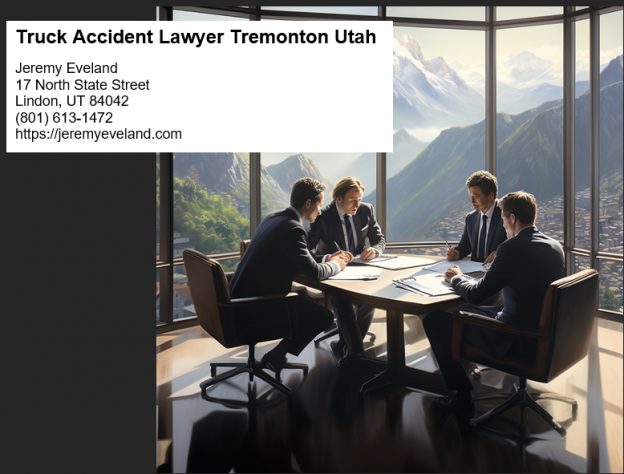Are you facing the daunting task of dealing with a personal injury? Look no further! Attorney Jeremy Eveland is here to help you navigate through the complex legal process. With his expertise in personal injury cases, he will provide you with the guidance and reassurance you need during this challenging time. From addressing common legal concerns to optimizing your content for search engines, this article covers it all. By incorporating important information and creating emotional connections, you will find yourself compelled to reach out to Attorney Eveland for a consultation. Don’t wait any longer, take the next step and seek the assistance you deserve.
What is a Personal Injury Lawyer?
a personal injury lawyer is a legal professional who specializes in providing legal representation to individuals who have been injured physically, mentally, or emotionally as a result of the negligence or wrongdoing of another party. Whether it’s a car accident, medical malpractice, workplace injury, or any other type of personal injury case, a personal injury lawyer is there to help you navigate the legal process and ensure that your rights are protected.
Personal injury lawyers are well-versed in the laws surrounding personal injury claims and have the expertise to handle complex legal procedures. They work closely with their clients to gather evidence, calculate compensation, negotiate with insurance companies, and, if necessary, take the case to trial. Their goal is to help their clients receive the fair and just compensation they deserve for their injuries and losses.
Why You Need a Personal Injury Lawyer
Understanding the Legal Process
One of the primary reasons why you need a personal injury lawyer is their in-depth understanding of the legal process. Navigating the legal system can be overwhelming, especially if you’re already dealing with the physical and emotional toll of your injuries. A personal injury lawyer will guide you through each step of the process, from gathering evidence to filing the necessary paperwork and representing you in court, if needed. They have the knowledge and experience to ensure that your case is handled efficiently and effectively.
Protecting Your Legal Rights
When you’ve been injured due to someone else’s negligence, it’s important to know and understand your legal rights. However, without proper legal representation, it can be difficult to advocate for yourself and protect those rights. A personal injury lawyer will work tirelessly to protect your rights and ensure that you are treated fairly throughout the legal proceedings. They will advocate on your behalf, negotiate with insurance companies, and fight for the compensation you deserve.
Negotiating with Insurance Companies
Dealing with insurance companies can be extremely challenging, especially when they try to minimize or deny your claim. Insurance companies are profit-driven, and their primary goal is to pay out as little as possible. A personal injury lawyer is well-equipped to handle negotiations with insurance companies. They will use their knowledge and experience to build a strong case, gather evidence, and calculate the full extent of your damages. With a personal injury lawyer by your side, you are more likely to receive a fair settlement that adequately compensates you for your injuries and losses.
Calculating and Pursuing Compensation
Determining the value of your personal injury claim can be complex and involves several factors, including medical expenses, lost wages, pain and suffering, and property damage. A personal injury lawyer has the expertise to accurately calculate the full extent of your damages and pursue maximum compensation on your behalf. They will gather all the necessary documentation, such as medical records, expert opinions, and witness statements, to support your claim and strengthen your case. With their help, you can be confident that you are seeking fair and just compensation for the harm you have suffered.
Handling Complex Legal Documents
Personal injury cases involve a substantial amount of paperwork and legal documentation. From filing a lawsuit to drafting settlement agreements, personal injury lawyers are skilled at handling and preparing complex legal documents. They will ensure that all documents are properly completed, accurately reflect your claim, and are submitted within the required deadlines. By entrusting the legal documentation to a personal injury lawyer, you can focus on your recovery while knowing that your case is being handled with the utmost care and attention to detail.
Types of Personal Injury Cases
Personal injury cases can arise from a variety of situations. Here are some common types of personal injury cases that a personal injury lawyer can handle:
Car Accidents
car accidents are one of the most common causes of personal injury. Whether it’s a minor fender bender or a serious collision, a personal injury lawyer can help you navigate the intricacies of car accident claims. They will work to establish liability, gather evidence, negotiate with insurance companies, and ensure that you receive fair compensation for your injuries and property damage.
Motorcycle Accidents
Motorcycle accidents often result in severe injuries due to the lack of protection for riders. Personal injury lawyers who specialize in motorcycle accidents understand the unique challenges faced by motorcycle accident victims. They are well-versed in the laws and regulations specific to motorcycle accidents and can advocate for your rights to ensure that you receive the compensation you deserve.
Truck Accidents
Accidents involving large commercial trucks can have devastating consequences. Due to their size and weight, truck accidents often result in catastrophic injuries or even death. Personal injury lawyers who specialize in truck accidents have the knowledge and expertise to handle the complex legal issues that arise in these cases. They will investigate the accident, gather evidence, and work to hold all responsible parties accountable for your injuries and losses.
Slip and Fall Accidents
Slip and fall accidents can occur in various premises, such as supermarkets, hotels, or public spaces. These accidents can result in serious injuries, including broken bones, head injuries, and back injuries. A personal injury lawyer can help you determine liability and pursue compensation from negligent property owners or managers. They will gather evidence, interview witnesses, and build a strong case on your behalf.
Medical Malpractice
Medical malpractice occurs when healthcare professionals fail to provide the standard of care expected in their profession, resulting in harm to the patient. These cases can be complex, involving intricate medical knowledge and legal procedures. A personal injury lawyer specializing in medical malpractice can navigate the complexities of these cases, consult with medical experts, and fight to hold the responsible parties accountable for their negligence.
Workplace Injuries
Workplace injuries can happen in any industry and can be caused by various factors, such as unsafe working conditions, faulty equipment, or employer negligence. Personal injury lawyers who specialize in workplace injuries understand the workers’ compensation system and can help you navigate the process of filing a claim. They will ensure that you receive the benefits and compensation you are entitled to under the law.
Product Liability
Product liability cases arise when a defective or dangerous product causes injuries or harm to the consumer. Whether it’s a faulty automobile part, a defective medical device, or a dangerous household product, personal injury lawyers who specialize in product liability can hold the manufacturers, distributors, and sellers accountable for their negligence. They will investigate the product’s design and manufacturing processes, gather evidence, and fight for the compensation you deserve for your injuries.
Wrongful Death
Wrongful death claims occur when an individual’s death is caused by the negligence, recklessness, or intentional misconduct of another party. These cases are complex and emotionally challenging for the surviving family members. A personal injury lawyer specializing in wrongful death can provide compassionate legal support during this difficult time. They will help you navigate the legal process, gather evidence, and advocate for justice on behalf of your loved one.
How to Choose the Right Personal Injury Lawyer
Choosing the right personal injury lawyer is crucial to the success of your case. Here are some key factors to consider when selecting a personal injury lawyer:
Experience and Expertise
It’s important to choose a personal injury lawyer who has extensive experience and expertise in handling personal injury cases similar to yours. Look for a lawyer who specializes in personal injury law and has a proven track record of success. They should have a deep understanding of the legal complexities and nuances in personal injury cases and be up-to-date with the latest laws and regulations.
Reputation and Track Record
Research the reputation and track record of the personal injury lawyer you are considering. Read client reviews and testimonials to get a sense of how they have handled cases in the past. Look for a lawyer who is known for their professionalism, integrity, and dedication to their clients. A strong track record of successful settlements and courtroom verdicts is a good indication of their competence and ability to effectively represent you.
Communication and Availability
Effective communication is essential in any attorney-client relationship. Choose a personal injury lawyer who communicates clearly and regularly with their clients. They should be accessible and responsive to your questions, concerns, and updates on your case. Being able to trust and rely on your lawyer’s communication skills will give you peace of mind throughout the legal process.
Resources and Staff
Personal injury cases often require extensive resources, including access to medical experts, accident reconstruction specialists, and investigators. Ensure that the personal injury lawyer you choose has the necessary resources to build a strong case on your behalf. Additionally, consider the size and capabilities of their legal team. A well-staffed law firm with experienced paralegals and support staff can provide the necessary support and attention to detail required for your case.
Fee Structure and Payment Options
Discuss the fee structure and payment options with the personal injury lawyer before hiring them. Many personal injury lawyers work on a contingency fee basis, which means they only get paid if they successfully recover compensation for you. Make sure you fully understand and agree with their fee structure before proceeding. It’s also important to clarify any additional costs or expenses that may arise throughout the legal process.
Steps to Take After a Personal Injury
Experiencing a personal injury can be overwhelming and stressful. Here are some important steps to take after a personal injury:
Seek Medical Attention
Your health and well-being should be the top priority after a personal injury. Seek immediate medical attention for your injuries, even if they seem minor. Prompt medical treatment not only ensures your well-being but also documents your injuries and establishes a link between the accident and your injuries. Follow all medical advice and attend all recommended follow-ups to aid in your recovery and support your personal injury claim.
Report the Incident
Report the incident to the appropriate authorities or property owners, depending on the type of accident. For car accidents, notify the police and obtain a copy of the police report. If you’re injured on someone else’s property, inform the property owner or manager and ask for an incident report to be prepared. Reporting the incident immediately helps establish a record of the accident and can strengthen your personal injury claim.
Gather Evidence
Collect as much evidence as possible to support your personal injury claim. This includes photographs of the accident scene, your injuries, and any property damage. If there were any witnesses to the accident, obtain their contact information. Keep all documents related to your injury, such as medical bills, receipts for expenses, and correspondence with insurance companies. The more evidence you have, the stronger your case will be.
Document Your Injuries
Keep a detailed record of your injuries, symptoms, and the impact they have on your daily life. This includes tracking your pain levels, limitations on your activities, and any emotional distress you may be experiencing. Documenting the progression and impact of your injuries provides valuable evidence of the damages you have suffered and can help your personal injury lawyer accurately calculate your compensation.
Preserve Witness Statements
If there were witnesses to the accident, contact them as soon as possible to obtain their statements. Witness statements are valuable evidence that can corroborate your version of events and support your personal injury claim. Ask witnesses to provide a written statement or, if that’s not possible, record a video or audio statement. Make sure to collect their contact information in case further clarification is needed.
Contact a Personal Injury Lawyer
Once you have taken the initial steps to address your injuries and gather evidence, it’s essential to consult with a personal injury lawyer. They will provide you with expert advice, evaluate the strength of your case, and guide you through the next steps. It’s important to contact a personal injury lawyer as soon as possible to ensure that crucial evidence is preserved and your rights are protected.
The Personal Injury Claim Process
Understanding the personal injury claim process can help you know what to expect throughout your case. Here are the main stages of the personal injury claim process:
Initial Consultation
The personal injury claim process begins with an initial consultation with a personal injury lawyer. During this meeting, you will discuss the details of your case, provide any relevant documents or evidence, and ask any questions you may have. The lawyer will evaluate the strength of your case and advise you on the best course of action.
Investigation and Evaluation
After the initial consultation, the personal injury lawyer will conduct a thorough investigation into your case. This may involve gathering additional evidence, consulting with medical experts or accident reconstruction specialists, and interviewing witnesses. The lawyer will evaluate the strength of your case and determine the appropriate legal strategy moving forward.
Demand Letter
Once your injuries and damages have been fully assessed, the personal injury lawyer will prepare a demand letter to the at-fault party or their insurance company. The demand letter outlines the details of your claim, including the extent of your injuries, the impact on your life, and the compensation you are seeking. The lawyer will negotiate with the opposing party to reach a fair settlement.
Negotiation and Settlement
Negotiating a settlement is a crucial part of the personal injury claim process. Your personal injury lawyer will enter into negotiations with the at-fault party or their insurance company to reach a fair settlement that adequately compensates you for your injuries and losses. Your lawyer will advocate on your behalf, using their negotiation skills and legal expertise to maximize your compensation.
Litigation and Trial
If a fair settlement cannot be reached through negotiations, your personal injury lawyer may recommend pursuing litigation. Litigation involves filing a lawsuit and taking the case to court. Your lawyer will prepare your case for trial, gather additional evidence, and represent you in court. They will present your case to a judge or jury and fight to secure a favorable verdict and the compensation you deserve.
Proving Negligence in a Personal Injury Case
Proving negligence is a fundamental aspect of a personal injury case. To establish negligence, you must demonstrate the following elements:
Duty of Care
In a personal injury case, the first element to establish is the existence of a duty of care. This means that the at-fault party had a legal obligation to act in a reasonable manner to prevent harm to others. For example, drivers have a duty of care to follow traffic laws and drive safely.
Breach of Duty
The next element is demonstrating that the at-fault party breached their duty of care. This involves showing that they failed to act as a reasonably prudent person would have in similar circumstances. This could include actions such as speeding, texting while driving, or failing to maintain a safe premises.
Causation
Causation requires showing that the at-fault party’s breach of duty was the direct cause of your injuries. You must establish that your injuries would not have occurred if not for the at-fault party’s actions or negligence. This can be proven through medical records, expert testimony, and other evidence.
Damages
Lastly, you need to demonstrate that you have suffered damages as a result of the at-fault party’s negligence. Damages can include medical expenses, lost wages, pain and suffering, and property damage. Collecting documentation and evidence of your damages is crucial to support your claim.
Successfully proving negligence requires a comprehensive understanding of the legal principles surrounding personal injury cases. Personal injury lawyers have the expertise and experience to gather evidence, consult with experts, and present a compelling case that establishes negligence and holds the at-fault party accountable.
Understanding Compensation in Personal Injury Cases
Compensation, also known as damages, is awarded to personal injury victims to help them recover from their injuries and losses. The types of compensation available in personal injury cases may include:
Medical Expenses
Personal injury victims may be entitled to compensation for their medical expenses, including hospital bills, surgeries, doctor visits, medications, physical therapy, and other necessary treatments. It’s important to keep detailed records of all medical expenses incurred as a result of the injury.
Lost Wages
If your injuries prevent you from working or result in a temporary or permanent loss of income, you may be entitled to compensation for lost wages. This includes both past and future lost wages. Your personal injury lawyer will work with employment experts if necessary to accurately calculate your lost earning potential.
Pain and Suffering
Personal injury victims often experience physical pain, emotional distress, and a reduced quality of life as a result of their injuries. Compensation may be awarded for pain and suffering, which includes physical and mental anguish, emotional distress, loss of enjoyment of life, and psychological trauma.
Property Damage
In cases where property is damaged due to someone else’s negligence, such as in a car accident, compensation may be awarded to cover repair or replacement costs. This can include damage to vehicles, personal belongings, or other property.
Punitive Damages
In certain cases involving particularly egregious conduct, punitive damages may be awarded as a way to punish the at-fault party and deter similar behavior in the future. Punitive damages are typically reserved for cases where the defendant’s actions were intentional or involved a willful disregard for the safety of others.
The amount of compensation awarded in a personal injury case will vary depending on the specific circumstances and the extent of the injuries and losses suffered. Personal injury lawyers use their expertise to accurately calculate the full extent of your damages and fight for maximum compensation on your behalf.
Common Challenges in Personal Injury Cases
Personal injury cases can present certain challenges that require the expertise of a personal injury lawyer. Here are some common challenges you may encounter:
Statute of Limitations
Each state has a statute of limitations, which sets a deadline for filing a personal injury lawsuit. If you fail to file a lawsuit within the specified time frame, you may be barred from pursuing a claim. Personal injury lawyers are well-versed in the specific deadlines in your jurisdiction and will ensure that your case is filed in a timely manner.
Shared Fault
In situations where both parties share some degree of fault for the accident or injury, the concept of comparative negligence comes into play. Comparative negligence reduces the amount of compensation a plaintiff can recover based on their percentage of fault. Personal injury lawyers work to establish liability and minimize any claims of shared fault to maximize your compensation.
Insurance Issues
Insurance companies often employ tactics to minimize payouts or deny claims altogether. They may dispute liability, undervalue the extent of your injuries, or attempt to settle for an unfairly low amount. Personal injury lawyers are well-versed in dealing with insurance companies and will advocate fiercely on your behalf to ensure you receive a fair settlement.
Complex Legal Procedures
Personal injury cases involve complex legal procedures and requirements, such as filing deadlines, discovery, and court rules. Navigating these procedures can be challenging for individuals without legal experience. Personal injury lawyers understand the intricacies of the legal system and will guide you through each step, ensuring that all necessary deadlines and requirements are met.
Navigating these challenges requires legal expertise and extensive experience in personal injury law. A personal injury lawyer will use their knowledge and skills to overcome these obstacles and protect your rights throughout the legal process.
Frequently Asked Questions
How long do I have to file a personal injury lawsuit?
The time to file a personal injury lawsuit varies depending on the jurisdiction and the specific circumstances of your case. Each state has a statute of limitations, which sets the deadline for filing a lawsuit. It’s important to consult with a personal injury lawyer as soon as possible to ensure that your claim is filed within the applicable statute of limitations.
What should I do if the insurance company denies my claim?
If the insurance company denies your claim, it’s important to consult with a personal injury lawyer right away. Insurance companies often deny valid claims or offer low settlements in an attempt to protect their profits. A personal injury lawyer will review your case, gather any additional evidence needed, and fight for the compensation you deserve. They can also guide you on any further legal action that may be necessary.
How much does it cost to hire a personal injury lawyer?
Many personal injury lawyers work on a contingency fee basis, which means they only get paid if they successfully recover compensation for you. Instead of charging an upfront fee, they receive a percentage of the final settlement or court award. This fee structure allows individuals who may not have the financial means to afford legal representation to access quality legal services. It’s important to discuss the fee structure with your personal injury lawyer during the initial consultation to ensure you have a clear understanding of the costs involved.
In conclusion, a personal injury lawyer is essential to navigate the complex legal process, protect your legal rights, and pursue fair compensation for your injuries and losses. Whether you’ve been injured in a car accident, slip and fall incident, or any other personal injury case, consulting with a personal injury lawyer can provide you with the expertise and support needed to achieve the best possible outcome. Contact a personal injury lawyer today to discuss your case and take the first step towards obtaining justice and the compensation you deserve.









































